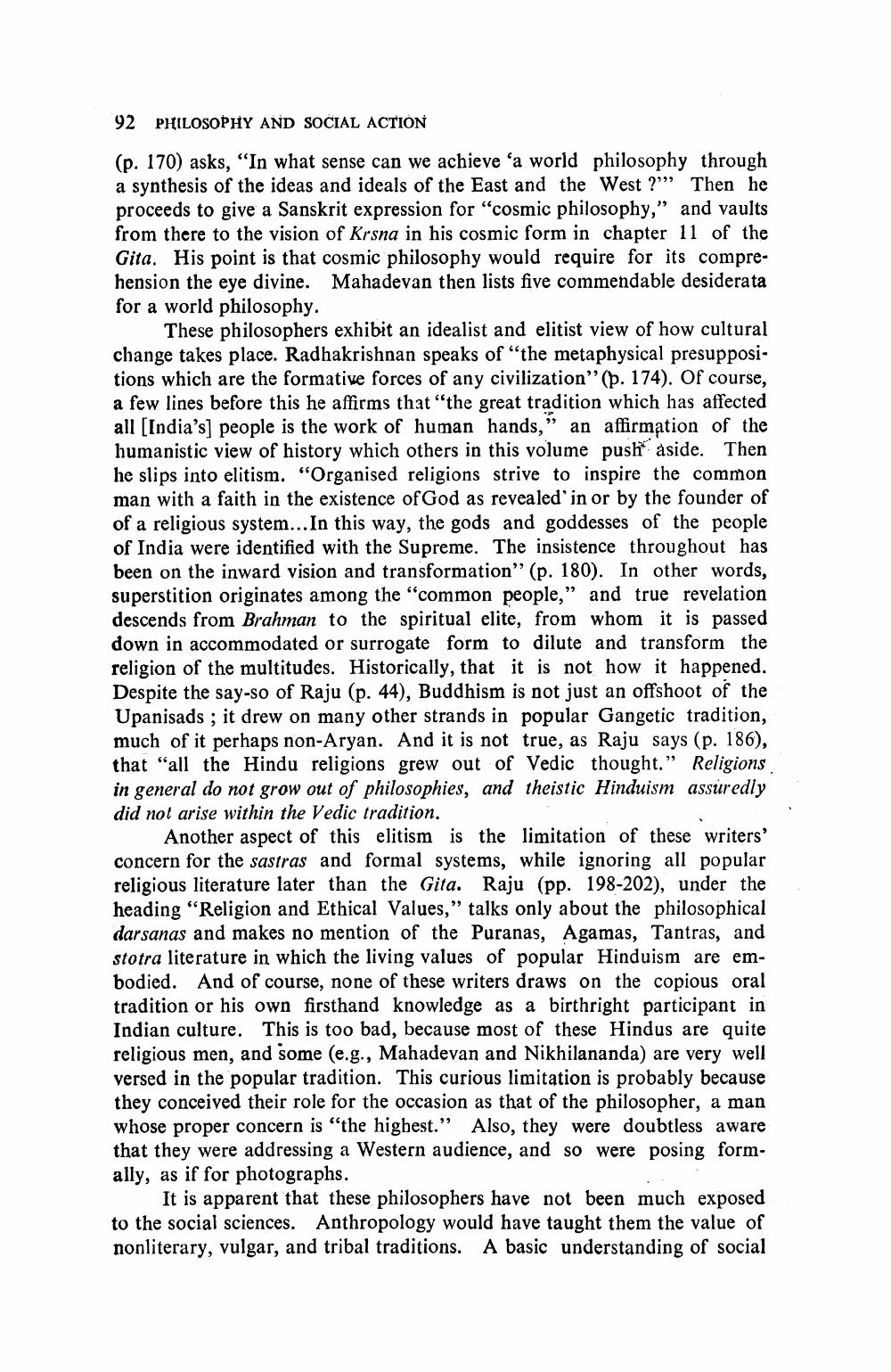Book Title: Indian Mind Essentials Of Indian Philosophy And Culture Author(s): Richard H Robinson Publisher: Richard H Robinson View full book textPage 5
________________ 92 PHILOSOPHY AND SOCIAL ACTION (p. 170) asks, "In what sense can we achieve 'a world philosophy through a synthesis of the ideas and ideals of the East and the West ?"" Then he proceeds to give a Sanskrit expression for "cosmic philosophy," and vaults from there to the vision of Krsna in his cosmic form in chapter 11 of the Gita. His point is that cosmic philosophy would require for its comprehension the eye divine. Mahadevan then lists five commendable desiderata for a world philosophy. These philosophers exhibit an idealist and elitist view of how cultural change takes place. Radhakrishnan speaks of "the metaphysical presuppositions which are the formative forces of any civilization" (p. 174). Of course, a few lines before this he affirms that "the great tradition which has affected all [India's] people is the work of human hands," an affirmation of the humanistic view of history which others in this volume push aside. Then he slips into elitism. "Organised religions strive to inspire the common man with a faith in the existence of God as revealed' in or by the founder of of a religious system... In this way, the gods and goddesses of the people of India were identified with the Supreme. The insistence throughout has been on the inward vision and transformation" (p. 180). In other words, superstition originates among the "common people," and true revelation descends from Brahman to the spiritual elite, from whom it is passed down in accommodated or surrogate form to dilute and transform the religion of the multitudes. Historically, that it is not how it happened. Despite the say-so of Raju (p. 44), Buddhism is not just an offshoot of the Upanisads; it drew on many other strands in popular Gangetic tradition, much of it perhaps non-Aryan. And it is not true, as Raju says (p. 186), that "all the Hindu religions grew out of Vedic thought. Religions in general do not grow out of philosophies, and theistic Hinduism assuredly did not arise within the Vedic tradition. Another aspect of this elitism is the limitation of these writers' concern for the sastras and formal systems, while ignoring all popular religious literature later than the Gita. Raju (pp. 198-202), under the heading "Religion and Ethical Values," talks only about the philosophical darsanas and makes no mention of the Puranas, Agamas, Tantras, and stotra literature in which the living values of popular Hinduism are embodied. And of course, none of these writers draws on the copious oral tradition or his own firsthand knowledge as a birthright participant in Indian culture. This is too bad, because most of these Hindus are quite religious men, and some (e.g., Mahadevan and Nikhilananda) are very well versed in the popular tradition. This curious limitation is probably because they conceived their role for the occasion as that of the philosopher, a man whose proper concern is "the highest." Also, they were doubtless aware that they were addressing a Western audience, and so were posing formally, as if for photographs. It is apparent that these philosophers have not been much exposed to the social sciences. Anthropology would have taught them the value of nonliterary, vulgar, and tribal traditions. A basic understanding of socialPage Navigation
1 ... 3 4 5 6 7 8 9 10 11
